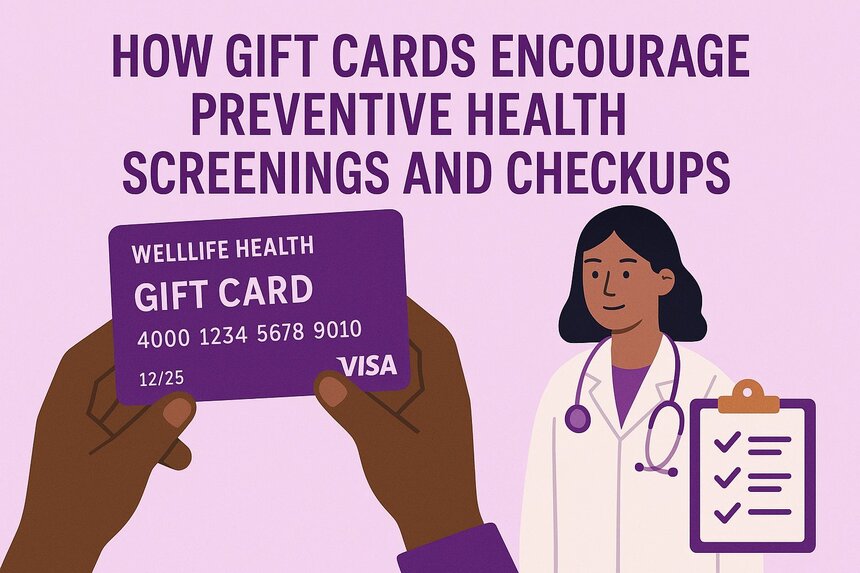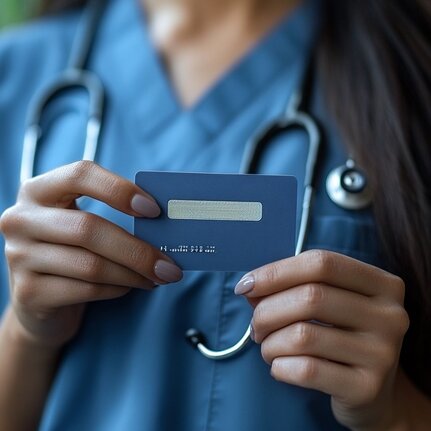March 2025 | PerfectGift Experts | 5 Minute read

Preventive healthcare plays a crucial role in reducing long-term medical costs and enhancing quality of life. By focusing on early detection and intervention, preventive measures can lead to significant health and economic benefits.
Investments in preventive care can lead to substantial cost savings by avoiding expensive treatments for advanced diseases. The Institute of Medicine estimates that the U.S. spends an extra $55 billion annually due to missed disease prevention opportunities.
Offering gift card incentives has proven to be an effective strategy in increasing participation rates for health screenings and preventive care.
- When people receive something of value for completing a task, like a health screening or annual checkup, it reinforces positive behavior and motivates them to continue engaging in healthy practices.
- Gift card incentives can create a sense of urgency around scheduling and attending screenings. Limited time offers, such as “Get a gift card when you schedule your checkup by the end of the month,” encourage individuals to take immediate action. The gift card becomes a motivator for those who might procrastinate or are unsure about the importance of timely checkups or screenings.
- Incentives can make individuals feel that there is something to gain by acting now, turning a delayed task into something they want to complete sooner rather than later.
When you partner with PerfectGift, you gain access to top-tier recognition methods, rewards programs, and appreciation techniques.
The Role of Incentives in Healthcare Engagement
The effect of individual behavior on health outcomes is considerable with estimates that up to 40% of premature deaths in the developed world are attributable to unhealthy behaviors.
Delaying or avoiding preventive healthcare is a multifaceted issue influenced by various factors, including financial constraints, psychological barriers, and systemic challenges. Understanding these factors is crucial for developing strategies to promote timely and effective preventive care.
Incentives play a pivotal role in influencing human behavior, serving as catalysts for initiating and sustaining various actions.
Customized rewards, designed to align with individual preferences, can promote autonomous motivation, leading to healthier behaviors and their maintenance even after the incentives are removed.
Many corporations within the health and wellness sector employ gift cards to motivate clients to engage in fitness programs, purchase health-related products, or attend wellness seminars. These incentives promote a healthy lifestyle and customer retention.


Gift Cards as a Powerful Motivator
Healthcare organizations have successfully utilized gift card incentives to encourage patients to schedule and attend health screenings. For instance, Trillium Health Resources implemented a Member Incentive Program that promotes healthy behaviors and education through gift cards and small rewards. This program has been instrumental in boosting member engagement in health-related activities.
A study published in the Journal of General Internal Medicine found that participants preferred gift cards over cash incentives for health-related activities, including screenings. This preference highlights the effectiveness of gift cards in engaging patients and encouraging their participation in preventive care.
Industries within the healthcare sector also use gift care incentives to drive initiatives.
- When people receive something of value for completing a task, like a health screening or annual checkup, it reinforces positive behavior and motivates them to continue engaging in healthy practices.
- Gift card incentives can create a sense of urgency around scheduling and attending screenings. Limited time offers, such as “Get a gift card when you schedule your checkup by the end of the month,” encourage individuals to take immediate action. The gift card becomes a motivator for those who might procrastinate or are unsure about the importance of timely checkups or screenings.
- Incentives can make individuals feel that there is something to gain by acting now, turning a delayed task into something they want to complete sooner rather than later.
Types of Preventive Screenings Encouraged by Gift Cards
Gift cards serve as an effective incentive to encourage participation in various preventive screenings. By offering a small reward, healthcare providers can motivate individuals to prioritize their health, seek timely care, and ultimately reduce the burden of preventable diseases.
For example, patients who complete their annual checkup may receive a gift card, which can be redeemed for groceries, retail products, or other useful items. By offering this reward, healthcare providers help reduce barriers to accessing care, while promoting regular checkups that can catch early warning signs of conditions like diabetes, high blood pressure, or heart disease.
· Annual checkups and wellness visits are essential for monitoring general health, identifying risk factors, and preventing chronic conditions. However, many individuals delay or skip these visits due to time constraints, lack of awareness, or perceived cost. Gift cards serve as an incentive to encourage participation in these routine appointments.
· Cancer screenings like mammograms and colonoscopies are vital for detecting cancer early, when it is more treatable. Despite their importance, many individuals delay or avoid these screenings due to fear, anxiety, or misconceptions. Offering gift cards encourages participation and helps overcome these barriers.
· Vaccinations are crucial for preventing the spread of infectious diseases like the flu. However, some people avoid vaccines due to fears or misconceptions. Gift card incentives can motivate individuals to get vaccinated, helping increase vaccination rates and protect public health.
Several local and state health departments use gift cards as incentives for flu shots and other vaccinations, aiming to increase immunization rates, particularly in underserved communities.
· Routine dental cleanings and eye exams are essential for preventing oral diseases and vision issues. Some managed care organizations use gift card incentives to encourage patients to complete preventive services such as dental checkups and eye exams. This helps ensure early detection of issues like cavities or glaucoma.

How Businesses and Healthcare Providers Can Implement Gift Card Programs
Implementing gift card incentive programs can effectively encourage positive behaviors among patients and employees in healthcare settings. However, it's crucial to design and manage these programs thoughtfully to ensure compliance with legal standards and ethical considerations, while also measuring their success.
- Best practices for structuring a gift card incentive program:
- Define Clear Objectives: Establish the behaviors and outcomes you aim to promote.
- Set Transparent Eligibility Criteria: Communicate the requirements clearly.
- Offer Meaningful Rewards: Offer Gift Cards relevant to the receiver.
- Compliance and ethical considerations:
- Be mindful of federal and state laws regarding inducements. Offering free or discounted items or services to patients, especially those under government programs, may violate regulations unless structured within legal exceptions.
- Clearly document and disclose the purpose of the incentive program to all stakeholders to uphold ethical standards and trust.
- Measuring success:
- Track enrollment numbers, attendance rates, and engagement levels before and after implementing the incentive program.
- Analyze data on health improvements, such as early detection rates of conditions due to increased screenings.
- Gather input from participants to identify strengths and areas for improvement.
Conclusion
Preventive care is key to improving health outcomes and reducing long-term medical costs. By engaging in routine screenings, checkups, and health assessments, individuals can detect health issues early, often before symptoms appear. This leads to better outcomes, less severe conditions, and reduced treatment costs over time.
For healthcare systems, focusing on prevention rather than treatment is more cost-effective, ultimately reducing the burden of chronic diseases, emergency care, and hospitalizations. In turn, this improves the overall efficiency and sustainability of healthcare systems, benefiting society at large.
By adopting gift card incentive programs, healthcare providers and organizations can improve patient engagement and contribute to healthier communities.
With PerfectGift you can start implementing gift card incentives today to see the positive impact on patient participation, health outcomes, and long-term healthcare savings.